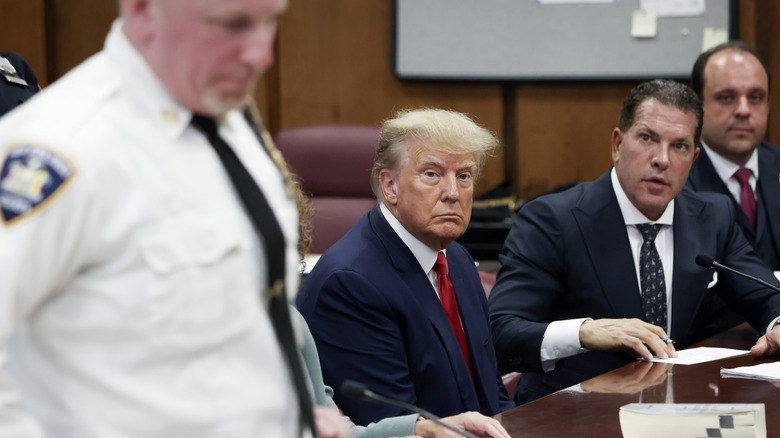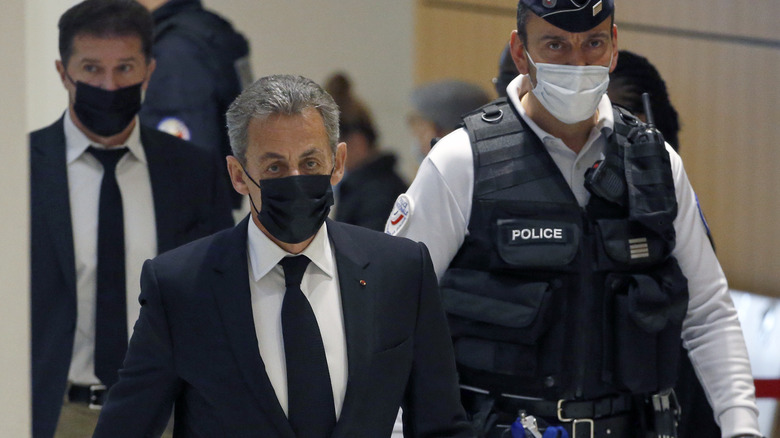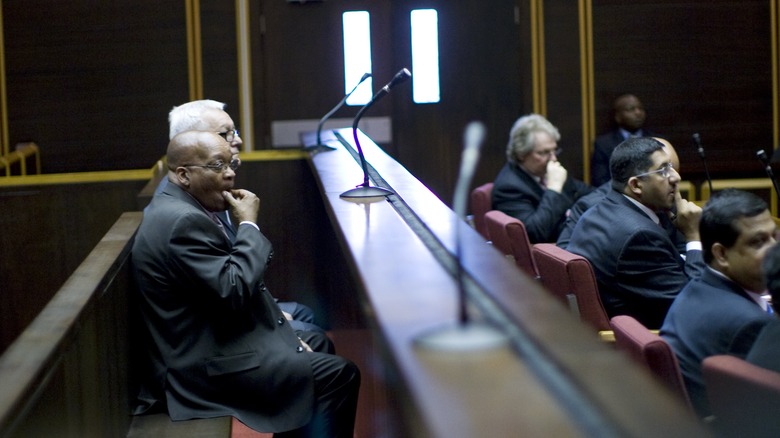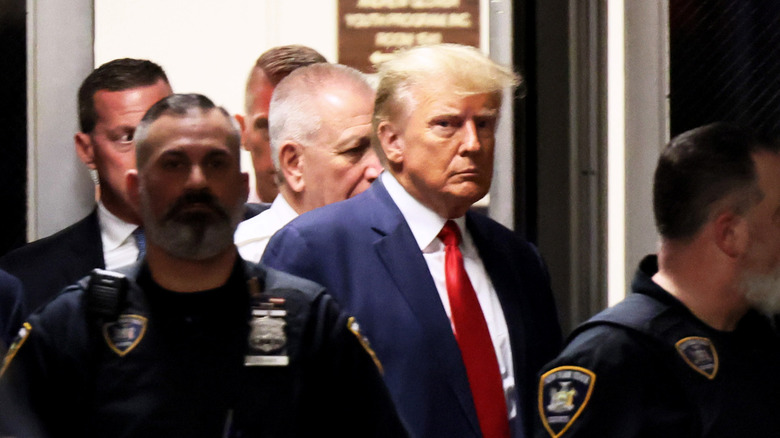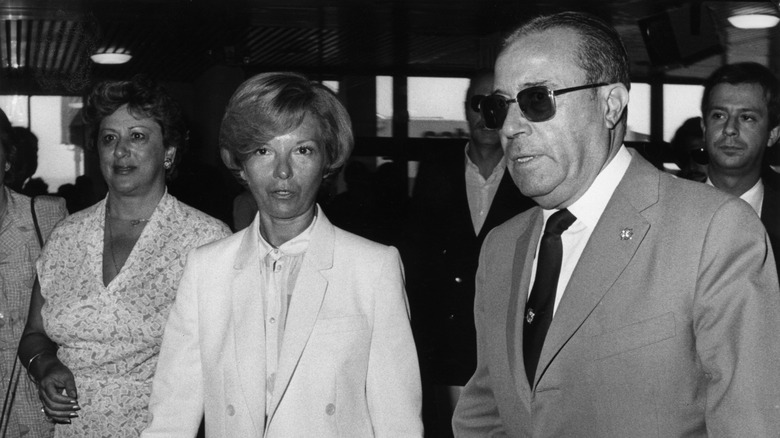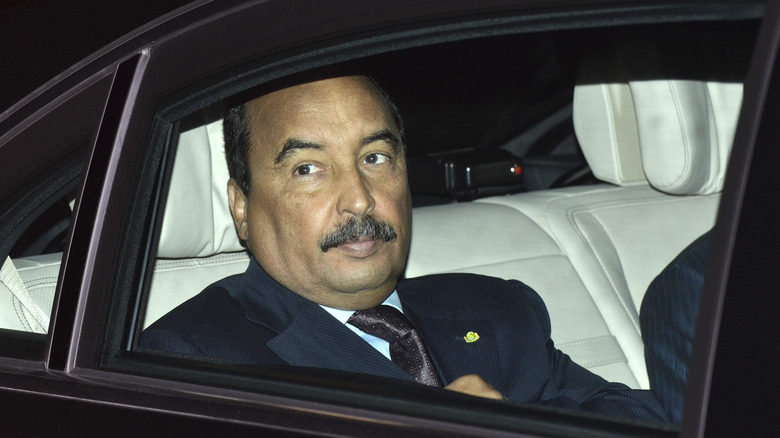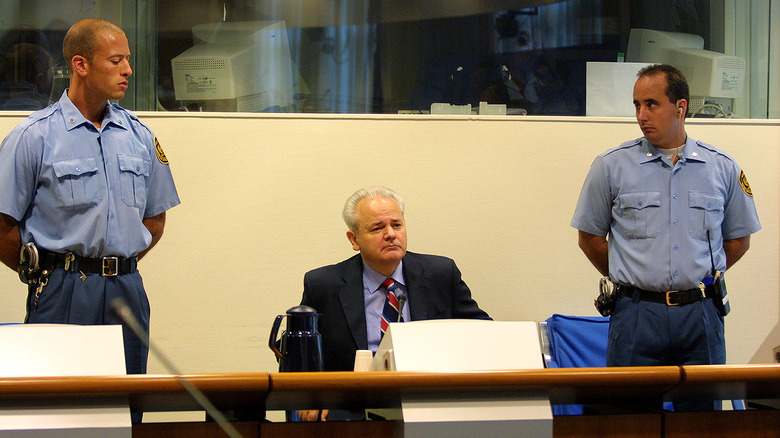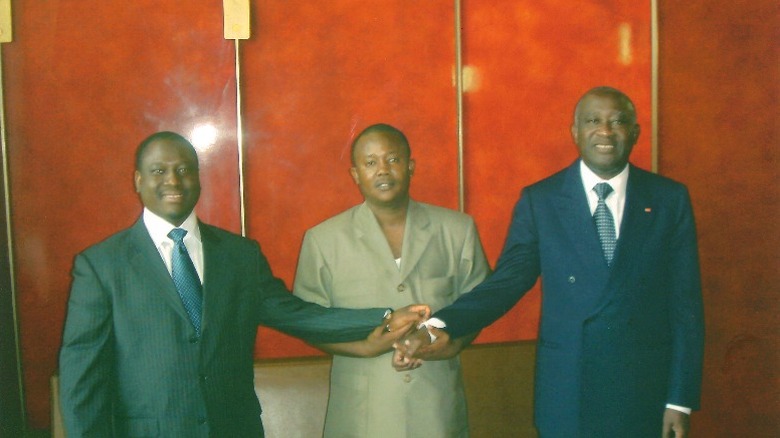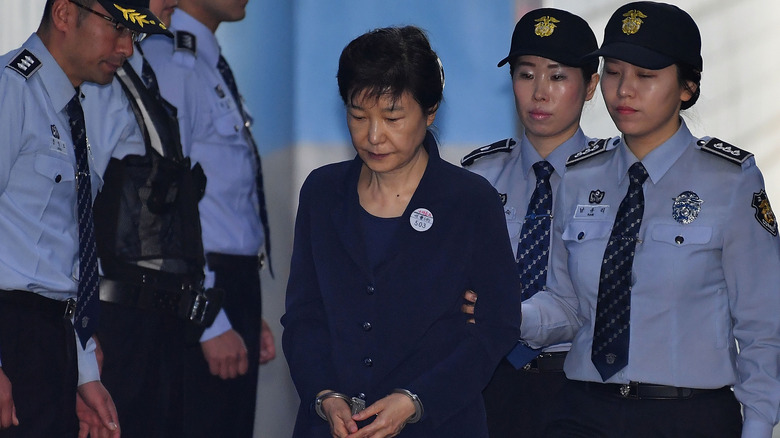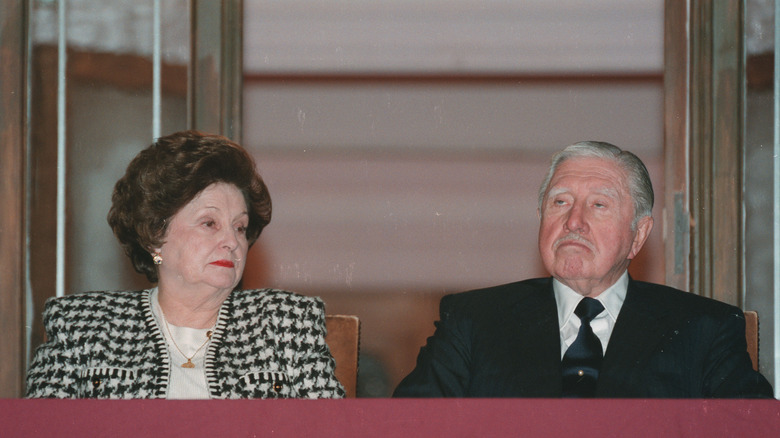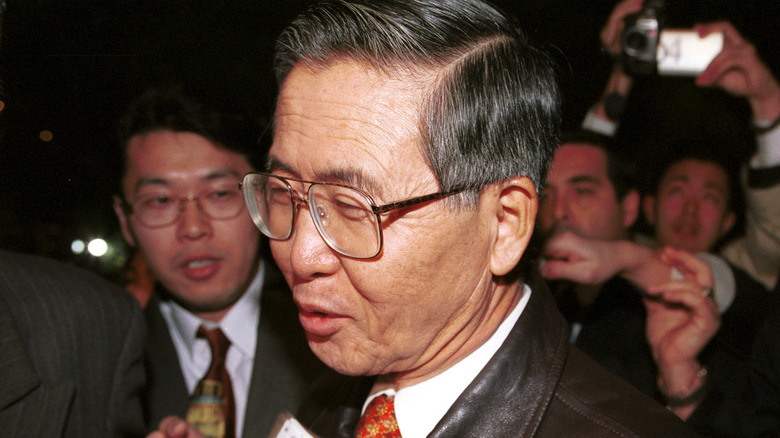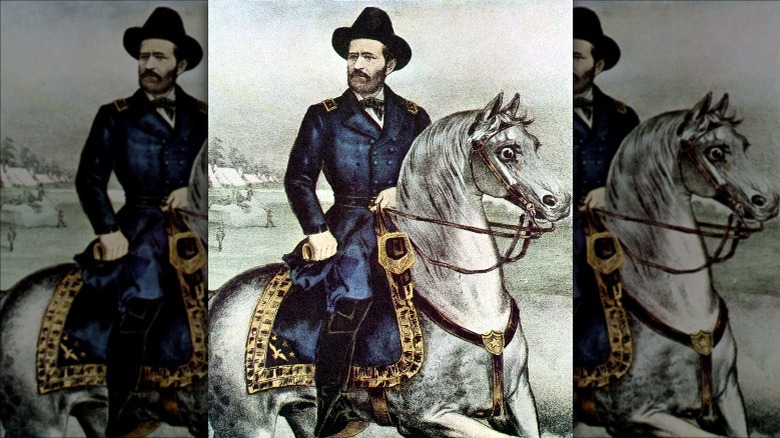World Leaders Who've Been Arrested
For those who have never been in positions of power — real, globally influential levels of power, not assistant manager at Best Buy power — it's easy to think that you could be the exception to the rule when it comes to corruption. You would be a truly benevolent leader, of course, and would never take advantage of all that political strength for your own gain. It's a nice thought, but as actual world leaders prove time and again, it's seemingly impossible to be in charge for any period of time and not be tainted by the amount of authority bestowed upon you.
After all, once you are to the level of, say, the leader of a whole entire country, there's really no reason to start committing crimes. You have a huge mansion to live in, people who wait on you, fancy cars and bodyguards, and making money will never be a problem again. Doing illegal things just puts you in danger of losing all of that. And yet, the presidents and prime ministers of the world just can't seem to stop themselves from committing crimes ranging from financial to genocidal.
While plenty of politicians are so powerful they never have to answer for their crimes, others do face consequences. While it's not common, world leaders have occasionally found themselves under arrest, facing the inside of a courtroom, and even, sometimes, spending time in prison. Whether they were dictators or democratically elected, here are world leaders who've been arrested.
Nicolas Sarkozy
Nicolas Sarkozy was president of France from 2007 to 2012 and was perhaps most famous outside of that country for his marriage to supermodel Carla Bruni the year after taking office. But one can't have everything in life, and Sarkozy failed to win reelection in 2012.
He had really wanted to win, too, so much so that he ignored France's strict spending rules for political campaigns, blowing through the maximum amount he was allowed to splash out. To those more used to U.S.-style elections, the numbers seem comically tiny for a presidential campaign: Sarkozy spent about $50 million, which was double the approximately $25 million allowed by law. The prosecution argued that the then-president willfully ignored the overspending, while Sarkozy said it was ridiculous to think he paid close attention to details like that: "Can you imagine me going into a meeting to discuss the cost of flags?" he argued in court (via France24). "I had too much to do."
In 2021, he was found guilty and sentenced to house arrest — although this was put on hold while the appeals process was ongoing. Amazingly, that wasn't even the first time Sarkozy was convicted of crimes that year. Seven months earlier, he was found guilty in a different trial on charges of effectively bribing a judge for legal information about a case he was not privy to in 2014. After he lost his appeal in 2023, he was ordered to spend one year under house arrest and wear an ankle monitor, with an additional two years of his sentence suspended.
Jacob Zuma
Jacob Zuma was an important figure in South Africa long before he became the country's third democratically-elected president after the end of apartheid. He was heavily involved in the fight to end that injustice, along with Nelson Mandela and so many others. So it was perhaps not surprising that he won the presidency in 2009. However, by that point, the sheen was already slightly off the freedom fighter, as he was facing accusations of corruption before he even took office.
Once he had real power, things got worse. Over the nine years he spent in office, Zuma allowed shocking levels of corruption at the federal level. It didn't help that South Africa's upward economic trend and increasing political influence had a downturn under his watch as well.
After he left office in 2018, the country wanted to investigate what had gone wrong, so a commission was set up to look into Zuma's corruption. But when compelled to appear, the former president refused. He was charged with contempt of court and sentenced to 15 months in prison in 2021, a decision he compared to both apartheid and a death sentence. At first, he said he would not turn himself in, and his supporters threatened violence. But in the end, minutes before the police would have taken him by force, he surrendered himself to custody. He served only a few months before being granted parole for medical reasons, although this decision was quickly overturned.
Donald Trump
The arrest of former president Donald Trump was unprecedented in the United States. While he was under several active criminal investigations in 2023, the first one to lead to charges was in New York City. The Manhattan District Attorney brought 34 felony cases against the former president, all relating to falsifying business records to do with hush money payments made to cover up a sexual encounter with Stephanie Clifford, a.k.a. adult film star Stormy Daniels. Trump appeared in court for his arraignment on April 4, 2023, where he pleaded not guilty to all counts.
In a post-arraignment speech to supporters at Mar-a-Lago that was covered by almost every major news network, Trump called out the judge who had been randomly assigned to his case and even mentioned the judge's family members. This led to dozens of threats against them over just the next 24 hours. This was not surprising, considering everyone from Trump's former advisors to Fox News hosts, to Qanon conspiracy theorists made veiled and even blatant comments about how Trump's arrest would lead to violence.
The wheels of justice turn slowly, and Trump was not expected to be back in court for a hearing until December 2023, with the trial not starting until possibly as late as spring 2024, which could be interesting timing if Trump is still in the running for president at that point.
In June 2023, the former president was indicted in Florida for his handling of classified documents after he left office. Then in August, Special Council Jack Smith indited Trump in Federal court for crimes related to his attempts to overturn the 2020 election.
Isabel Perón
Juan Perón was president of Argentina three times and is also famous as the husband of Eva "Evita" Perón. After Evita died, Juan met and married Isabel Martinez. Juan died during his third term in office in 1974, and his widow was elected to take his place as president.
Isabel Perón was not a politician and within two years, she had been ousted in a coup. She not only lost her job but found herself under arrest, spending the next five years under house arrest, charged with misappropriating money from a charity. In 1981, she was released and moved to Spain. By 1983, she'd received an official pardon and it was even thought she would return home and run for office again. In the end, she stayed in Europe.
In early 2007, on orders from an Argentinian judge, Isabel was arrested in Spain, this time charged with crimes against humanity. She was suspected of masterminding state-sponsored terrorism during her time in charge and running death squads. Others were also charged, but her last name made her particularly important to be held accountable. At the time of her arrest, the Argentinian Nobel Peace Prize winner Adolfo Perez Esquivel told the AP (via NBC News), "Once and for all, we have to get to the bottom of this problem and find out how this terrorism was generated by the state. The search for the truth must go in every direction." However, in 2008, Spain refused Argentina's extradition request.
Mohamed Ould Abdel Aziz
On paper, Mohamed Ould Abdel Aziz sounds like an almost faultless leader of the West African nation of Mauritania. He came to power in a 2008 coup, sure, but so had all the other presidents of the country at that point, and at least his was "bloodless." While in office, he worked hard to end the violence that had been raging for years. He served just two terms before stepping down by choice in 2019, peacefully handing over to the next president, in an important first for Mauritania.
However, while Aziz came from extremely humble roots, by the time he left office, he was rolling in dough, which some thought was rather suspicious. Mauritania's parliament looked into it and came away with plenty of evidence of corruption. In 2021, Aziz was charged with corruption and money laundering and arrested before he could flee to Europe. He was placed under house arrest until his trial was scheduled to begin in January 2023.
Aziz denied he'd done anything wrong, and his lawyers pointed to conspiracies against their client as reasons for the charges. One told the AP the prosecution was "unfair and unjust and it consecrates control of the executive power on our justice," while another said to Al Jazeera, "Lots of people have grounds for hating him, including the Muslim Brothers, which he threw out of the country." After several delays due to pre-trial legal wrangling, Aziz's trial began on April 6, 2023. He pleaded not guilty.
Slobodan Milošević
Slobodan Milošević was still the Yugoslavian president when he was first charged with crimes against humanity by the United Nations International Criminal Tribunal in 1999, something that was unprecedented. Since he was still protected and powerful, there was serious doubt Milošević would ever actually end up in court. But in 2001, he was arrested and brought to The Hague for trial.
By that point, there were even more charges against him for atrocities committed during the Balkan conflicts. The prosecution was taking no chances: Milošević was only charged with what they were sure they could prove, and they cut no corners when it came to the thoroughness of the trial. According to RadioFreeEurope, "It lasted 467 days, creating almost 50,000 pages of transcripts and 5,759 exhibits of evidence." The prosecution's case was probably made easier by the fact Milošević represented himself in court. Nevenka Tromp, a researcher for the prosecution, told the outlet, "Acting as his own advocate, he had read, watched, and listened to every piece of evidence presented against him."
Surely then, Milošević was convicted for all the murders and other atrocities he was accused of? Well, no. He got off on an extreme technicality: He died of a heart attack two months before the lengthy trial was finally due to end. According to Tromp, the stress of representing himself probably hastened his demise, on top of his already poor health. Sadly, he never officially had justice rendered to him.
Laurent Gbagbo
Laurent Gbagbo (pictured right) had been in politics for decades when he was elected president of Côte d'Ivoire in 2000. However, only a couple of years into his tenure, the country descended into civil war. Presidential terms are five years in the West African nation, but Gbagbo managed to use the conflict to delay the 2005 election until 2010. Then, when he lost that election, he refused to concede to rival candidate Alassane Ouattara. The resulting violence was on another level, with thousands dying. A U.S. source told CNN at the time that blames for the horrors should be placed squarely on Gbagbo since he "did not accept he lost. That's why we are here today."
In November 2011, a warrant was issued for Gbagbo's arrest and he was brought to the International Criminal Court for trial, charged with crimes against humanity. However, in 2019, Gbagbo and his co-defendant, Charles Blé Goudé, were acquitted of all charges against them. In a 2-1 decision, the majority explained the case was based on circumstantial evidence that did not sufficiently prove that there was any kind of coordinated plan of violence (rather than spontaneous outbreaks) and that there was not enough evidence to prove the co-defendants were directing the violence, planned or not. The acquittal was later upheld on appeal. It would be another three years after he was first found innocent before Gbagbo returned to Côte d'Ivoire at the personal invitation of President Ouattara.
[Featured image by Taha Riahi via Wikimedia Commons | Cropped and scaled | CC BY-SA 3.0]
Park Geun-hye
Park Geun-hye was no stranger to the running of South Korea when she was elected president in 2012; in fact, she'd lived in the presidential palace as a child when her father was the dictator of the country. While her father's time in office ended with his assassination, hers ended in 2017 after her impeachment and removal from office due to corruption. And shortly after that, she found herself in prison facing similar charges.
The next year, a court found Park guilty and sentenced her to 24 years. This was less than what the prosecution had asked for, but still harsh enough to send a clear message to the country's politicians. As the judge said from the bench (via CNN), "The President abused the power which was given to her by the citizens." Within months, an appeals court increased the sentence to 25 years. Then a 2020 retrial saw her receive a 20-year sentence. Finally, in 2021, President Moon Jae-in pardoned Park in order to bring the country together, so it could move on and fight the COVID-19 pandemic.
On her release from prison after serving five years, Park returned to her hometown and was greeted by hundreds of cheering supporters ... mostly. At least one person threw something at the former president as she spoke to the crowds, to which she said, "I am extremely grateful that so many people came to warmly greet me even though I had numerous shortcomings and disappointed you" (via Reuters).
Augusto Pinochet
General Augusto Pinochet took power in Chile in a violent 1973 coup. After that, things got really bad in the South American country. Despite the well-known atrocities committed and condoned by the dictator, no one ever actually thought he'd be made to answer for his crimes. So when Amnesty International put the word out to European governments that Pinochet was coming to the U.K. in 1998, even they didn't expect anything to come of it ... but, amazingly, it did.
Pinochet's arrest was truly international. In London, he was taken into custody by British police acting on a Spanish arrest warrant. The case against him came together thanks to evidence supplied by the United States. Even Cuba's Fidel Castro, who, despite being a fellow dictator was not a fan of Pinochet, was said to be shocked at the news. The former doctor of one of Pinochet's many political victims told The Guardian, "It is a great triumph of justice. Pinochet must now give account for more than 3,000 deaths, exiles, and tortures in the 17 years of his dictatorship."
One country that wasn't happy with Pinochet's arrest was Chile. Its government wanted to put the tragedy of the past behind them. They even allowed Pinochet to take advantage of a loophole he created, which made him a senator for life in order to avoid being prosecuted. In the end, diplomatic pressure and Pinochet's failing health kept the U.K. from extraditing him to stand trial in Spain.
Alberto Fujimori
The various arrests and criminal charges of Peru's former president Alberto Fujimori are quite the ride, so strap in. Fujimori was elected president in 1990 and stayed in the position until 2000. However, by that point, things were looking pretty bad for him, and the walls were clearly closing in. So he took a vacation to Japan, at which point he broke up with his country by fax, informing the government of Chile he was resigning.
By 2005, Fujimori had changed his mind, however, and returned to South America to run for president again. He didn't return directly to Peru, however, which meant his arrest for corruption and human rights abuses happened in neighboring Chile. There he languished in jail for two years before finally being extradited. Fujimori's first conviction came only a few months later when he was sentenced to six years for the illegal search of a residence.
But that was just the start. In 2009, a different trial for human rights abuses led to a 25-year sentence; just months after that he got another 7 and ½ years for corruption. Perhaps sick and tired of being in court, Fujimori chose to plead guilty in the final case against him for bribery, almost exactly two years after he was returned to Peru. Despite that long list of crimes, in 2017, the then-president of Peru pardoned Fujimori, which led to widescale protests in the country. The pardon was overturned by a court the following year.
Ulysses S. Grant
Not all world leaders are charged with crimes that shake the foundations of their governments. Back in the 1870s, Ulysses S. Grant, then the president of the United States, found himself repeatedly in trouble with the law in Washington, D.C. over something you might also have been dinged for: speeding. The difference, of course, is that cars barely existed at that point, and Grant was tearing around the capital in a horse-drawn carriage.
Grant was a big fan of horses, even by comparison to others who lived in those horse-dependant times. He'd been obsessed with riding since he was a kid, followed horseracing closely (sometimes betting on it as well), and was an exceptionally good trainer of his own horses. Like many people who do something they enjoy very well, Grant apparently liked to push the boundaries of what was acceptable when it came to taking his carriage out for a drive.
While it sounds like an urban legend, it's been confirmed by the modern Washington, D.C. police service that Grant was indeed arrested for speeding in 1872, as well as being cited for it on a couple of other occasions. The officer who performed the arrest was William H. West, a Black man and Union veteran, who told the story to the city's Evening Star newspaper in 1908 after he'd retired from police work. Not only was the president of the United States hauled off to the station, but his carriage and horse were also impounded.
